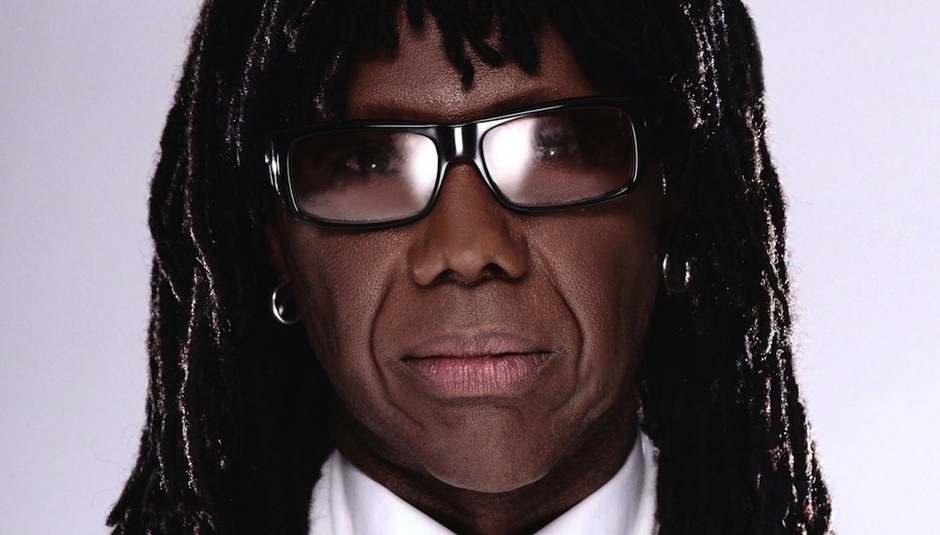There is a particularly touching story on Nile Rodgers' blog where he recounts the first morning after receiving his cancer diagnosis. He calls it “Waking up on Planet C”. It begins with Nile deciding to go on a solitary walk to his local diner where he has been going for the past 20 years. When he eventually arrives, 'We Are Family' by Sister Sledge comes on the stereo. It's one of Nile's most famous compositions yet the regulars in cafe didn't know him and his songwriting partner Bernard Edwards had written it. When he tells them that he wrote the song, "They looked at me like I was nuts" he writes. "I’ve known everyone in this eatery for about twenty years - but none of them knew I co-wrote it. My eyes welled up with tears." Arguably one of the most successful pop music producers of all time (seriously), Nile Rodgers' name is, surprisingly, new to many. Having been raised in New York to beatnik parents with a habitual heroin addiction, he came to prominence as the guitarist and songwriter in Chic, a band that was part of the vanguard of the disco scene in the mid-to-late 70s. Famed for their hits 'Le Freak' and 'Good Times', they reached the top of the charts but their time there was cut short almost-overnight on one fateful evening in 1979.
Disco Demolition Night, lugubriously known as "the day disco died", saw a mass burning of disco records at a baseball game at Chicago’s Cominskey Park. Organised by two local radio djs, the stadium descended into a full blown riot. Amidst a storm of criticism, in particular the genre’s perceived political apathy in favour of naive escapism (just imagine that happening nowadays!) the technicolour sparks of Chic and Disco were quickly blown out.
Derided by rock fans and critics alike, Nile and Bernard were forced to turn to alternative means to use their talents, namely writing and producing music for some of the biggest artists in the world. Madonna, David Bowie, Michael Jackson, Duran Duran, Grace Jones are just a few of the iconic names that have benefitted from Nile’s production over the years. His role in the shadows of the superstars may have led to a lot of wealth and success but it didn't equate to the same recognition that his peers enjoyed. He put it most succinctly in the opening line of a BBC documentary when he said, “You probably don't know my name, but I bet you know at least one of my songs”.
From that first morning on Planet C, he says he felt compelled not only to beat cancer, but to share the memories of his and Bernard’s songwriting partnership (Bernard died after a show in Japan in 1996. Most of the original line-up have also passed away). 4 years later and in remission, it’s fair to say that he has come some way in bringing back the good times, especially thanks to his collaboration with Daft Punk on ‘Get Lucky’ - a song so ubiquitous and stratospherically successful that I needn’t say any more about it.
I meet Nile, who is now 62, the week after his headlining performance at Bestival in the auspicious surroundings of a private members club in London, which comes complete with a bizarre collection of taxidermy including a kangaroo fitted with boxing gloves that appeared to be strategically placed behind me. I assume it’s so he can trigger a sucker punch should I ask the wrong question. Thankfully, he’s a nice guy and he’s also in a very talkative mood. As I ask my first question it soon becomes apparent why our interview is delayed by 30 minutes. Nile Rodgers is a raconteur and once he gets going with a story, he will not be stopped. It's a music hack’s dream. The fact that he is so affable and charming is just an added bonus.
We begin with Nile’s latest project involving the GoThinkBig project, an initiative to help young adults get life skills through work experience. Nile will be teaming up with Rudimental to remix ‘Le Freak’ and the release will be managed entirely by young whippersnappers, including everything from co-production and sound technicians through to studio managers, camera crew, stylists and box office to marketing.
“I ask a lot of people in this business; how did you get here?” he says of his motivation to get involved. “And usually it is, “Oh because my cousin needed someone to do so and so and then I met a guy and he said, ‘do you wanna work here?’” and so on. It’s always this happenstance situation so I figured if we did something which was more organised…” and he’s off. He begins what will be the first of many long side notes which are remarkable not only for their content (which at one point includes a brilliant impression of Michael Jackson begging Nile to come to the studio to record MJ’s HIStory album, and another in which he pretends to be Ray Charles persuading a pilot that he can fly a plane - both true stories) but also his ability to remember my original question long after I have forgotten it.
“…There is still going to be those things that happen when you have these disparate personalities together, that some people believe their art work is great and, unfortunately - you probably have friends like that - they go, “Look at this” and you go “Ooh, okay. . . great.” [laughs] But not everybody has the same skill sets - she thought she was a singer. She was an okay singer. But she’s an incredible lyricist so she can write for other people!”
His point is not just that my friends are haplessly mediocre at their respective artistic endeavours, but the project will guide those who may be more suited to the backroom roles of the industry to gain experience and help others find their niche. “We figured if we could put them together where there is a real project, that we are looking for some sort of outcome, we could do something really big”, he smiles. It’s about giving people a chance, something Nile says he has benefitted from his whole life. In 2010 they were asked to play Bestival in what was probably a fairly scant year for disco bookings on the festival circuit. A few years passed before they returned for a rapturously received mid-afternoon set in 2013. Bestival chief Rob da bank, being the sensible man that he is, was so impressed that he asked Nile & Chic to headline the following year. Not only that but they themed the whole event as ‘Desert Island Disco’ in his honour. I ask whether he considered this rise to headliner status as a victory for disco, considering disco on the whole hasn’t really had a festival headliner before.
“You know what is funny? It wasn’t victory. It was appreciation because these were some of the people that gave me a break again. Bestival were one of the few people that said ‘Hey, let’s get Nile Rodgers and Chic to play’ and they took a chance and we came and rocked the crowd.” He points to an injustice towards his catalogue given his successes which tie in with his experience in the diner after his diagnosis. “When you look back at my history, if you look at my discography, I honestly don’t know it but if you compared it to other producers, it’s serious. It’s like a lot. And when you look at modern producers and it looks like they’ve done more records, that’s because they only do singles whereas I had to do Diana Ross’ entire album, not just ‘Upside Down’ and ‘I’m Coming Out’. I had to do Sister Sledge’s entire album to do ‘We Are Family’ and ‘He’s The Greatest Dancer’. So I’ve done hundreds and hundreds and hundreds of records and they’re just records I’ve played on. Nobody even knows because they look at the video and they’ll see someone like Rick Derringer playing with Cyndi Lauper and he’s playing a solo and it’s MY solo.”
“Two years ago we played in Australia for the first time and when I got there someone told me that I had had 7 no. 1 singles in Australia and no promoter would ever hire me. That’s because they didn’t know what Chic did. And I said no, you don’t understand, all of those records I produced, I played them! I mean, I wasn’t just standing around. I played on INXS’ ‘Original Sin’, I played that [riff]. Even though the band has guitar players, I’m playing on every record. That’s why I think our shows work because the music sounds like the records cos we’re really playing them because we’re the guys that played on the records in the first place.”
During our conversation he describes reasonably well known events in his career like Chic’s first single ’Dance Dance Dance (Yowsah, Yowsah, Yowsah)’ or the Disco Sucks movement as though I might need reminding. Although he could be feeling kind to journalists who may not have done their research, I sense that over the years Nile may have become used to the idea that people have forgotten, or perhaps never realised, his rich musical legacy. Perhaps this is with good reason. For example, when I mention this interview to a few friends, some couldn’t believe my luck, others simply didn’t recognise the name, or Chic for that matter, which goes someway to explain his earlier quote (in a documentary about himself no less) about his lack of visibility. For a man that has written and produced records which are estimated to have sold over 200 million copies, this is borderline criminal.
But his star is certainly on the up. Along with ‘Get Lucky’, there has also been another hit single with Avicii, a performance on the X Factor and the Brit Awards as well as a slew of festival appearances. Headlining Bestival would have been the jewel in the crown had it not coincided with the passing of his long-term guitar technician and friend Terry Brauer, who passed away shortly before Nile was due on stage. It was a bittersweet moment for Nile and, quite understandably, he found it hard to keep his composure on the night. Not that he sees it that way.
“I adore Terry, I love him, I love his family. I love what he has done for me and his level of dedication to me, which was incredible. The thing that that bothered me the most or probably that I will never forget was the fact that I went out to play the show - I knew I was going to play the show - but the fact that I was crying and I was bawling like a little baby. I just couldn’t stop crying.” He recounts a story about working in an airport before he made it in the music industry. “It was the airport that Frank Sinatra housed his plane and his mom died in a crash coming to see him. At least that’s what they said around the airport. I was a kid so I don’t know for a fact. But they said that he did the show, dedicated the show to his mom, and then flew to Palm Springs after the show. And I thought ‘Wow. People in show business give to others more than they give to themselves’. They give more than they take. That Frank Sinatra could have easily said, ‘my mother just died, I’m leaving’ and everyone would had understood. But he would have said ‘well if all these people paid to see me, I have to give them a show’.
He continues, “My life is not as important as your life when I’m doing a show. When I’m not doing a show, it may be. But when I’m doing a show, your life is more important than mine because I’m there to entertain you. You paid money, I’m getting paid. I couldn’t believe I was sitting there crying knowing all my life I have believed in the Frank Sinatra story…which I have always lived by because my job is a service job. I live to serve the job. There is a film called Ben Hur and there is a very famous scene in the film where they tell him [Judah Ben-Hur, the lead character played by Charlton Heston, once a wealthy prince who is enslaved in the galleys] to “Row well and live because you live to serve this ship”. And whenever I walk into the studio I think of Ben Hur and I say “I am 47 [his slave number], I live to serve this ship’. I’m not here for me. I am here for the artist that hired me.”
I suggest that it’s quite brave to show vulnerability on stage but he’s having none of it.
“Well I certainly wasn’t trying to be brave! The brave part was doing the show!” (laughs)
His next project is to finish the first Chic record in 22 years. He reveals that the album is partly comprised of original recordings and ideas from when him and Bernard were jamming in the legendary Power Station recording studio all those years ago. Realising my visible delight at this news, he divulges that he has hours and hours of recordings as they used to jam in the studio with the tape permanently on.
“Oh yeah! I’ve been able to save them. I even have cassettes where we’re just jamming because in the old days we were on a cassette all the time because cassettes didn’t cost anything so you would just run it so you’d just record every single thing. Because it is on magnetic tape, even those analogue cassettes sound really good. It’s not some cheap little thing, it’s going through a beautiful new console and wonderful limiters and it’s sounding great.”
Whilst Chic fans round the world will relish the opportunity to hear these not-so-lost tapes from an era that many would have assumed to be long gone, for Nile, it comes with an element of sadness too. “It’s taken a long time because it’s been really emotional, I have to be honest. Whenever I put the tapes up and I’m playing with me, Bernard and Tony, and hearing everybody sing. Some of the stuff, to me, was meant to stay jazzy and jammy because we were running from disco so we started formulating a new way to make people dance but hip-hop was such a powerful movement. That was funny because it was using so much of our music - they were all over that! Yeah “disco sucks” but half of those hip-hop tracks had disco samples on them! It was killing us because on one level people were telling us that our music sucks but meanwhile half of the records that were getting number 1s we had written like 8 years before that. It was great in those days but now it sucked and we couldn’t understand that.”
He continues, “It is hard to put those tapes up and hear those guys laughing and joking and knowing that behind that there was a lot of sadness because we knew that those records weren’t going anywhere because we had no market. There was no place for a live band in those days. And if you look at the market, the live bands were getting cut and cut and cut, meaning the black live bands. The white live bands were getting signed and signed and signed. The black live bands were getting cut.”
Things don’t appear to have changed much either, he notes. “Right now in America there are only three that I know of that have record deals; Chic, The Roots and Prince. That’s it. No Earth Wind and Fires, no Con Funk Shun, no Cameo, no Rufus, none of those bands that we grew up with, none of those guys have record deals. Chic, The Roots and Prince are the only three live bands that have record deals but meanwhile white kids can walk down the street with guitars and get record deals every week. There’s a new band playing something, there’s Imagine Dragons, but there’s no version of Imagine Dragons in the black community. It’s like really sad for me. So when I signed I didn’t sign as Nile Rodgers, so I signed as a band, I signed as Chic.” You’re going to have to lead the charge, I suggest, just as his PR emerges (for the second time) to end our interview.
“I dunno about leading but I’m going to make a band-record making disco. A lot of it has my original members, some of it has a new people…I’m just recording and recording and figuring out what’s the most Chic-like [sound] at this period in my life because an album to me is like a film to a film maker, not a bunch of singles. It’s a snap shot of a story, of a moment in time, so that’s what I’m doing - figuring out that moment in time.”
Read more about gothinkbig.co.uk here.
























